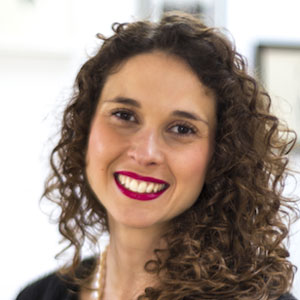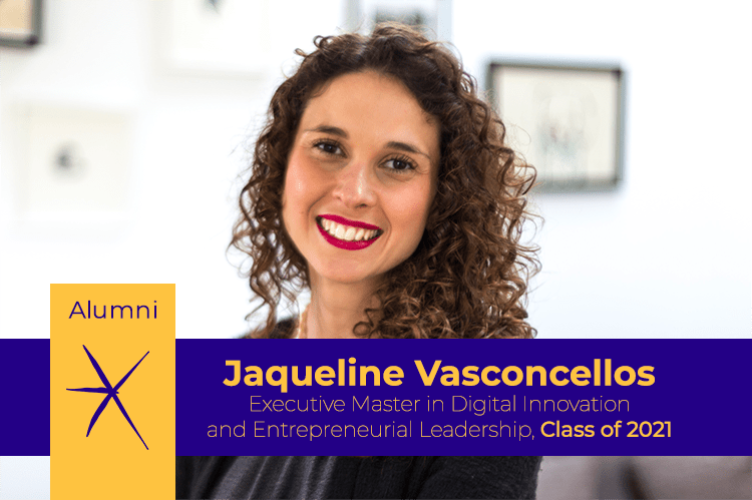Executive Master in Digital Innovation and Entrepreneurial Leadership (EMDIEL)
Meet the Alumni: Jaqueline Vasconcellos, Class of 2021
 Jaqueline is an entrepreneur with 17 years of experience in international scale-ups, SMEs and global companies where she has started, built, grown and restructured teams at strategic and operational levels. Jaqueline has worked mainly in the travel industry but also in hospitality, mobility, real estate, fashion, and healthcare. Today she is an entrepreneur in innovation between consulting and training. As an alumni of the Executive Master in Digital Innovation and Entrepreneurial Leadership (EMDIEL), Jacqueline shares insights on what the programme taught her about herself, about the meaning of collaboration in innovation and more.
Jaqueline is an entrepreneur with 17 years of experience in international scale-ups, SMEs and global companies where she has started, built, grown and restructured teams at strategic and operational levels. Jaqueline has worked mainly in the travel industry but also in hospitality, mobility, real estate, fashion, and healthcare. Today she is an entrepreneur in innovation between consulting and training. As an alumni of the Executive Master in Digital Innovation and Entrepreneurial Leadership (EMDIEL), Jacqueline shares insights on what the programme taught her about herself, about the meaning of collaboration in innovation and more.
Why did you choose the EMDIEL? Did you have specific goals or a general idea of how you wanted to evolve?
The first reason is that I am the kind of person who has the grit, learns by doing and wants to learn from mistakes. The failure of my first venture made me think that I lacked the tools to get the second one right.
Secondly, I wanted to work in the field of innovation and within the entrepreneurial ecosystem but I didn’t know how.
Thirdly, because I have an international background, and I thought an international program like this one would widen my global scope.
Could you tell us what was the most difficult challenge you faced during the programme?
Leveraging the fallout from COVID-19 was the most difficult challenge for the school and for our cohort. For me, it was a sea of opportunities, as some experts who would normally be super busy suddenly had time. Furthermore, there were numerous problems to be solved and it was a fantastic opportunity to test the waters and learn about entrepreneurship in various industries. I personally learn by doing, meaning that I took every opportunity to gain first-hand experience, exercise my knowledge, and make a real business. It required an amount of effort that not everyone has but I did.
How did the programme boost your professional success?
It can boost your professional career if you act upon it during the modules.First, it was revealing to understand more about myself. I discovered that I’m a born entrepreneur. I was born in Brazil and Brazil is a nation of natural entrepreneurs, because we have no stable economy and are therefore constantly taking risks. We are early adopters and novelty seekers. We have a young demographic, which is open to trying new things and businesses. We face a lack of resources to develop projects everyday, and therefore we easily accept losses as part of the learning curve. This was essential in understanding how I should shape my new future.
Second, I started the EMDIEL with an idea that I wanted to work in the startup ecosystem and the field of innovation, however I didn’t know how or where. Thanks to the EMDIEL I managed to define my professional life mission and envision the long-term career goal I want to achieve.
I am happy to realise my vision in this current VUCA (Volatility-Uncertainty-Complexity-Ambiguity) era. I have an optimistic belief that we can fix everything that has been broken and destroyed on our planet. My mission is to help the planet, businesses and entrepreneurs to be resilient, and I achieve this by responsible consulting, entrepreneurial coaching and teaching.
Can you share with us a memorable experience from the programme that has impacted your life in the long run?
I have had a number of memorable moments. The course Future Modeling [Business Modelling and Prototyping] definitely was a life-changing and enlightening moment. It allowed me to found Speculative Futures Paris collective, an NGO with the mission to empower communities of futures thinkers. It focuses on speculative design, design fiction, critical foresight and experiential futures by organising conferences, roundtables and workshops. This initiative gave me the opportunity to speak with experts and attend high-level conferences. An approach that initially looked conceptual now makes a lot of sense. For business it imposes future-ready preparation with a powerful strategy, and for those who wish for a sustainable future, humanity-wise, it enables us to think about the impact of our current actions. Today, thanks to these initiatives and further acquired expertise, I am now a happy Foresight Practitioner.
What are your main takeaways from the EMDIEL? Were you expecting them, or did they come as a surprise?
A person’s takeaways depend on their background, experiences and expectations. Our cohort was significantly affected by COVID-19, but we all knew and accepted the challenge. My main takeaway is an understanding of the different shapes and forms that innovation and entrepreneurship can take. It can be a mindset, a style, a function, a business, a strategy, a culture, an ideology, a startup, an ecosystem, and the list goes on. I had an EMBA strategy teacher who said, “Innovation is turning ideas into invoices.” Even though that’s a narrow and limited way of looking at it, after the EMDIEL, this became just one out of many other phrases or sayings from that time.
Last but not least, according to your experience, what kind of profile would thrive in this programme?
People like me, whose first entrepreneurial venture failed and who want to get one right. Who want the second one to succeed. It’s not only for engineers who want to work with innovation. It’s also for business-minded people who want to survive in unstable economic environments.
Any final message you would like to convey to potential participants?
EMDIEL is truly a collective intelligence, a collective goal and a personal journey from the inside out. It is an Executive Master, however you will work in groups and it is far from an old-school university. It is an innovative executive master, and you should be ready to work in a group and enjoy achieving goals collectively and collaboratively.5;
It requires experience and maturity to contextualize the lectures and overcome the challenges of group collaborations. The spectrum of exploration is large, as is the amount of leverage you can gain from it, but you will be required to go the extra mile by yourself.
Campuses
